Australia’s competition regulator, the ACCC, has taken legal action against Microsoft, alleging that the Redmond-based tech giant misled about 2.7 million Australian subscribers to its Microsoft 365 service. Beginning in late October 2024, Microsoft reportedly raised prices for its “Personal” plans by 45% (to AUD 159) and for “Family” plans by 29% (to AUD 179) due to the inclusion of the AI assistant Copilot. According to the ACCC, Microsoft failed to disclose a third, cheaper “Classic” plan without Copilot—and only revealed its existence once users began the cancellation process.
The lawsuit claims that Microsoft’s communication — consisting of two emails and a blog post — gave a misleading impression that customers had to either accept the higher AI-inclusive price or cancel their subscription altogether. The ACCC is seeking court injunctions, consumer compensation, and hefty penalties — up to AUD 50 million or three times the financial gain Microsoft obtained through the practice.
Reddit users have expressed widespread frustration, with many saying they felt tricked. Some discovered the cheaper, non-AI subscription option only after starting to cancel. One user wrote:
“My subscription was renewing next month, this post just saved me $40.”
Many commenters described Microsoft’s behavior as a “dark pattern” — a manipulative design strategy that limits informed user choice.
This is not the first time Australia has taken a strong stance against global tech giants. The country has a long history of strict consumer law enforcement, regardless of a company’s size. Reddit users recalled similar cases — such as when Valve Corporation was fined AUD 3 million in 2016 after the Federal Court of Australia found that the company misled Steam users about their refund rights, violating the Australian Consumer Law (ACL).
Likewise, Microsoft’s major rival Google LLC was ordered to pay AUD 60 million for misleading Australian users about which account settings controlled the collection of location data. The court found that Google’s privacy options were designed to obscure how data sharing actually worked.
The Microsoft case could set a global precedent in the debate over integrating generative AI into paid services. Companies such as Adobe and Zoom have already begun similar moves, raising prices while bundling AI features. If the court sides with the ACCC, Microsoft may be forced to revise its subscription model — not only in Australia but also in other regions, including the European Union, where consumer protection laws often mirror Australia’s regulatory approach.


